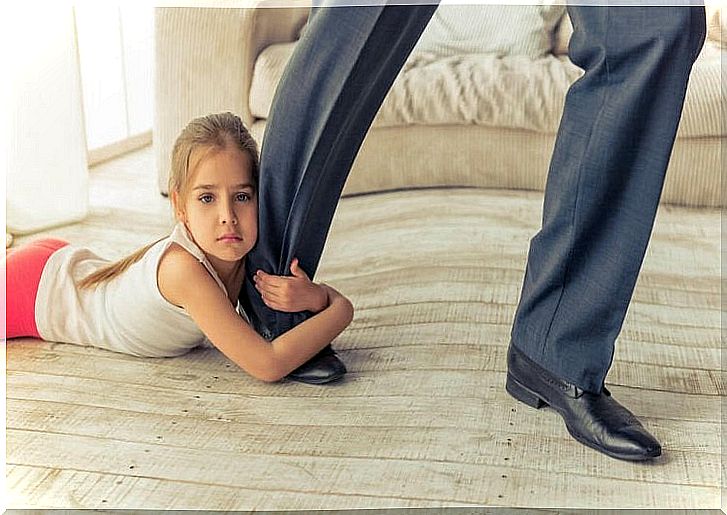Children Growing Up Without A Father
Single-parent families are becoming more and more common today. Even though the parent who is present strives to fulfill both roles, children who grow up without one parent may have emotional gaps that need to be addressed.

Families are changing more and more. In the Western world, the proportion of single-parent families is increasing and, consequently, the percentage of children growing up without a father or mother too.
Whatever the reason that led a family to be a single parent (divorce or separation of the couple, death of the couple or of the absent father), being alone with the children imposes challenges and difficulties to be resolved on a daily basis.
A single parent who brings up their child alone can experience difficult situations. Good organization and adequate support from those around you can also be of great help. Sooner or later the family will regain its balance and become functional again.
It can also become even more organized than in the days of family life as a couple. Indeed, the absence of conflict and the resulting reduction in stress make parents more focused on their own needs and those of their children.
In general, the troubles that divorces or separations can cause on children are irreversible. These situations can also affect other aspects of children’s lives such as university studies and, in some cases, their health.
Professionals say that children are able to adapt and assimilate situations. However, it is undeniable that these changes leave no one unscathed.
Find out below all our tips to help your children and cope better with the situation.
Growing up without a dad … or without a mom
Like never before, divorce rates are rising. Women and men decide to have children alone and thus assume their education. The most common is the absence of the father, but this also happens with the mother.
There are several reasons for this situation, but the fact is that there are more and more single-parent families. This has an emotional impact, both on children growing up without a father and on the society in which they live.
Although the mother bears the brunt of the upbringing, training and guidance of the child, the absent father, likewise, creates a huge emotional void. The father’s absence can be physical, either through death or because he is not responsible for the children.
On the other hand, there are cases when, although the father is present, he has no emotional connection with the children. In both cases (physical absence or emotional absence), the effects on children’s development and emotional balance are devastating.
The consequences of having an absent father
Except in the case of extended families, in which a parent takes on the role of the absent father, children who grow up without a father can develop various behavioral disorders. This has been widely recognized and accepted by all types of specialists.
To hide the feelings of unhappiness, anger, abandonment and fear that overwhelm them, children who grow up without a father may present with problems such as:
- Difficulty bonding with other children
- Attention deficit and poor academic performance
- Emotional void and low self-esteem
- Emotional issues such as anxiety, depression, or aggression
- Fear of abandonment, which causes rebellious behavior or social isolation
- Drug addiction or drugs
- Less solidarity and empathy
- Less self-control
- Low sense of guilt
- Gender identity issues
While raising and educating is a complex enough task for a newly formed couple, it is much more complicated if it all depends on one parent. A child needs positive reinforcement to grow up healthy and happy, to mature as a confident adult with good self-esteem.
The recommendations that we are going to give you in this article can help you in the difficult process of raising your children on your own.
1. Seek family support
If there is someone in the family who can actively help you raise your child, take the opportunity. Grandparents, an uncle or an aunt can fill some of the emotional void caused by the absence of a father.
2. Get psychological help
Don’t be afraid to seek professional psychological advice. It can help you understand the consequences of the father’s absence.
You will also be able to discuss the problems that may arise in the relationship with your child and the necessary forgiveness that you must grant not only to yourself, but also to the parent who no longer accompanies you in the parenting process.
3. Avoid blaming the absent person
Any separation, whether desired or not, is an important event. We must mourn the life we had before. Some parents feel guilty, and their self-esteem can suffer.
Single parenthood also leads in some cases to financial difficulties, conflicts, physical or psychological disorders or isolation.
In times of stress with your child, avoid arguments but also blame the parent or absent child. If you speak badly about the father, you won’t get anything positive. Often, children feel guilty about the father’s absence, even though they are not responsible for it.
4. Don’t make comparisons
Avoid comparing your family with another family where both parents are present. However, your child will most likely do it on their own, so avoid doing it on your own. These comparisons hurt, produce frustration, and deepen the hurt.
5. Establish clear and flexible rules
When a woman is home alone, she tends to be very strict with following the rules or very lax. Neither of these attitudes is good for children growing up without a father.
There must still be clear but at the same time flexible rules that can be adapted to each circumstance. This will help your children and ensure their happiness and well-being as well as yours.
6. Spend time with your kids
If there is no one to share responsibility with, there can often be an overload of tasks and activities to accomplish. However, make time for yourself, even if you have little, to share it and enjoy it with your children, study with them, read stories or go for walks.
Think of yourself too. A few moments of rest or relaxation will help you have the energy you need to apply healthy discipline. Sleep, pay attention to your diet, confide in someone who will listen to you, relax (meditation, yoga, etc.), play sports or have a social activity.
7. Tolerance and patience
Have tolerance and patience, both with your children but also with yourself. There will be hard times, accept them. Avoid wanting to occupy both roles, it is impossible.
You can fill only one role and, from there, give the best for your child. What does not go well today may be resolved later.
If you are the only one raising your children, it is important to leave the possibility of restoring your family one day or another. It won’t be an easy decision, as the person you meet must understand and accept that your children are a part of your reality.
Likewise, this new person should assimilate this, getting involved with you as he will also have to take on a role within the family.
However, don’t deny yourself the opportunity to be happy with a new partner. So locking yourself up or lamenting doesn’t make sense. Rebuilding the family gives your child the opportunity to restructure the bonds and affections with the father figure that your child needs.
The family, whatever its typology, is the pillar on which the development of the individual is based. Know why the family is so important in raising children. The family has a great impact on the growth of children. On their emotional and social development.
The family shapes the way they think, the way they make decisions, the way they behave and even their outlook on life. The environment in which a child grows up defines him as a person. Therefore, the importance of the family in its development is essential.









